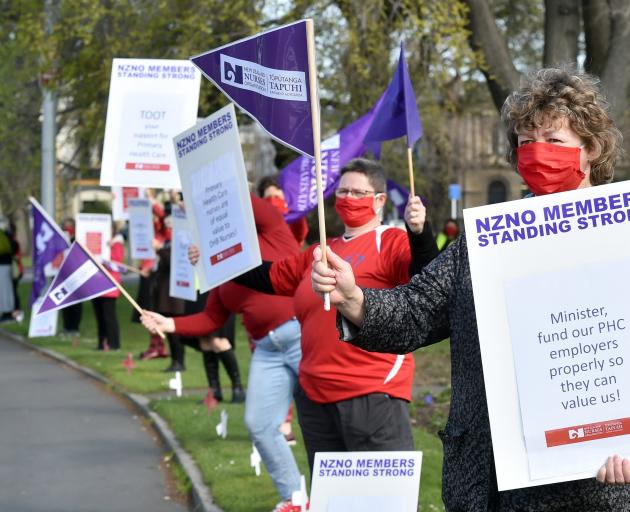
Those forming the fence at the top of the cliff deserve fairness
The future of New Zealanders’ health will rest in the hands of primary healthcare staff. They need to be paid accordingly, writes Teresa Wasilewska.
During almost 50 years of nursing in three different countries and health systems, I have always voted against strike action, believing/hoping that disagreements could be resolved with informed and balanced discussion between healthcare providers and administrators, who are supposed to have the population's health as their driving force.
Yet last week, having voted against strike action, I found myself waving a banner at Queens Gardens after the Government once again declined our request for pay parity for primary healthcare (PHC) nurses.
The facts?
• PHC nurses are usually employed in general practice, hence the term "practice nurse" — not "practising" to become nurses.
• We have the same qualifications, and most have significant hospital (secondary care) experience.
• Our base rate is at present 10.6% less than our hospital colleagues, which is compounded by less favourable penal rates when working unsocial hours and public holidays (hospital nurses are at present seeking a further pay rise, which would widen this gap).
• PHC nurses can progress through five salary steps, while hospital nurses have seven, and district nurses (also district health board-funded) have eight pay grades.
• New Zealand has a complex health funding system, with district health boards (DHB) funded to provide free hospital and community care. A previously designated "practice nurse subsidy" has vanished into bulk funding allocated from each DHB to general practices on a patient population basis.
• PHC employers support pay parity for nurses in their employment — but do not have sufficient funds (allocated by the DHB) for this to happen.
• The Government tells us that pay parity is not their responsibility, as our employers are private businesses; we see this as insulting, especially after actions such as extra government funding towards pay parity for early childhood education earlier this year.
Fortunately, PHC nurses see few of the dramatic life-threatening situations of acute hospital work, but must always be ready for that to occur. We must maintain knowledge and clinical skills, legal and ethical practice in all areas of care, not focusing on specialist practice.
Many PHC nurses work alone and do not have colleagues immediately available to provide peer review or a second opinion, or cover a meal break. We have a workload, not a shift roster, and if we do not complete it today, it will be there tomorrow.
We do not have allocated patients, but are responsible for a practice population of people who deserve to have their health needs delivered in a timely, accessible and evidence-based process compatible with the way each person chooses to live their life.
On any one day, we can deal with vaccinations, parenting support, screening, advocacy, acute and chronic care, social work support, phone calls, minor procedures, health education — as well as coronavirus.
Beyond this again, writes Jill Clendon, the interim chairwoman of the NZ College of Primary Health Care Nurses, "Primary healthcare is more than just provision of medical or nursing care in general practice (this type of care is what we call primary care). Primary healthcare includes this but extends further to include the way in which we identify and address the social determinants of health as well, things such as access to food, healthy housing, healthy social and physical environments and education."
Why do nurses work in primary care?
For many, the motivation is to work more independently as the fence at the top of the cliff, rather than the ambulance at the bottom. The future of health for our "team of fivemillion" will be more and more in the hands of primary healthcare, and PHC nurses; we need to ensure work conditions and remuneration are such that innovative, forward-thinking, proactive and respected nurses can be attracted to PHC, because all of us will need them one day.
- Teresa Wasilewska has been a nurse since 1971, working in hospitals, hospital funded community programmes, general practice and now urgent care.